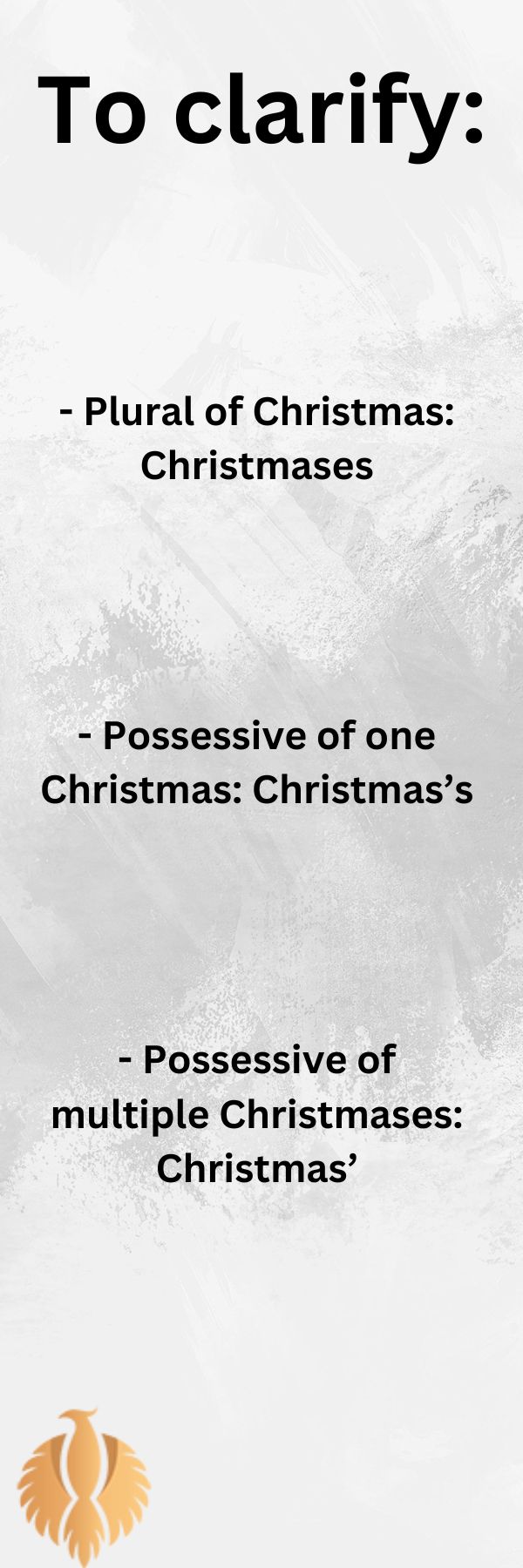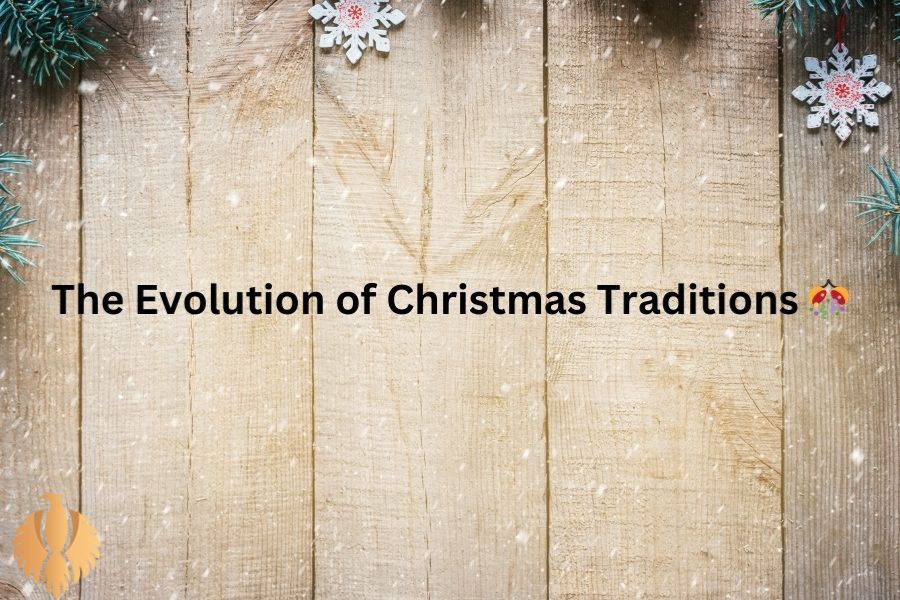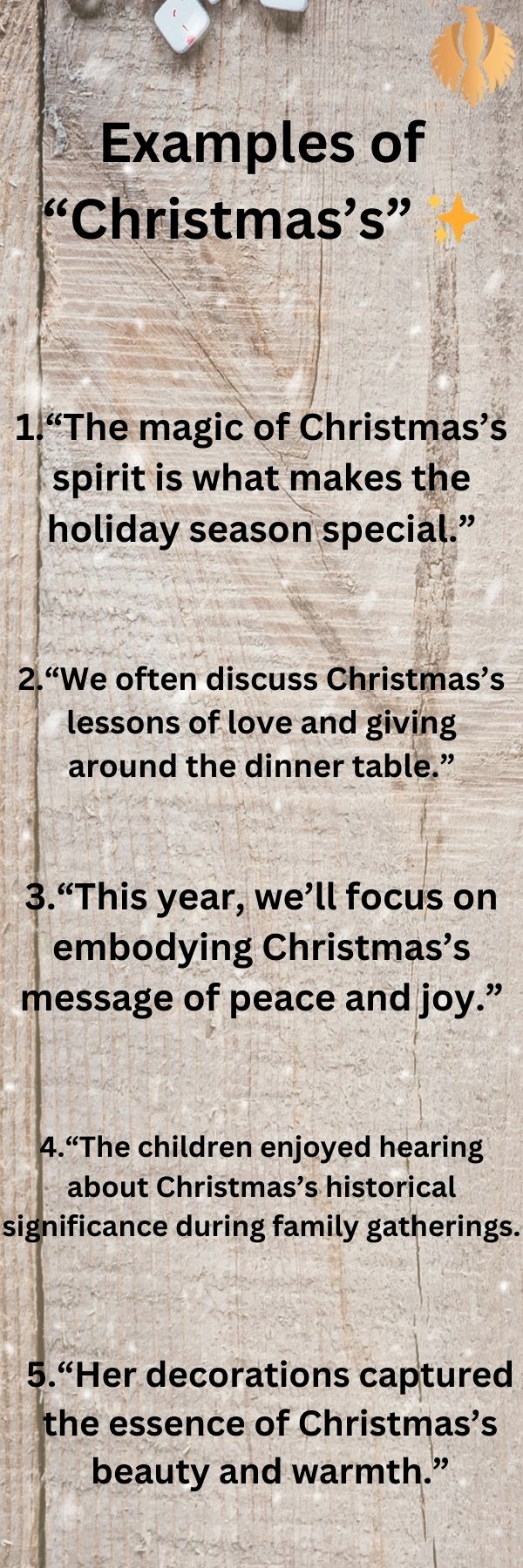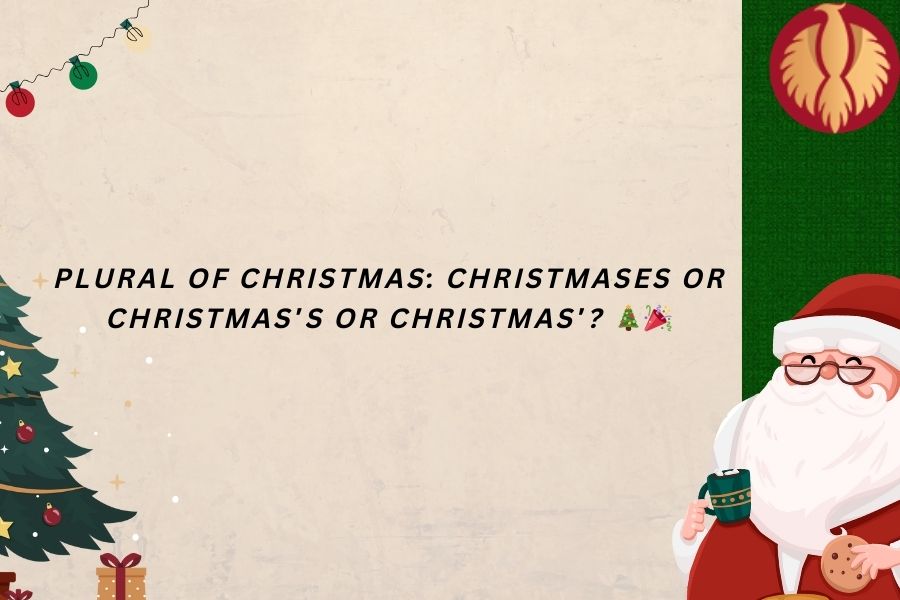When it comes to the festive season, the word “Christmas” is immediately evocative of joy, celebration, and family gatherings.
However, a delightful quandary arises when we seek to express more than one Christmas: should we opt for “Christmases,” “Christmas’s,” or “Christmas’” to represent the plural form? The answer is quite straightforward.
The correct plural form of Christmas is “Christmases.” The other two variations, “Christmas’s” and “Christmas’,” suggest possession rather than plurality.
In this article, we will delve deeper into the complexities of pluralizing “Christmas,” offer more detailed insights into why “Christmases” is the right choice, and provide numerous examples to elucidate proper usage.
As we navigate through this holiday lexicon, we aim to clarify the often-confusing rules of English grammar that guide our understanding of pluralization and possession.
You might also enjoy: Top 100 Commonly Used Verbs That Start With D [2024]
Understanding Pluralization in English
Before we dive deeper into the specific case of “Christmas,” it’s essential to explore the general rules of pluralization in English. Typically, forming the plural of a noun in English involves adding an “s” or “es” to the end of the word.
The regular pluralization can be straightforward; for example, “cat” becomes “cats,” and “dog” becomes “dogs.”
However, English is unique in that it includes many exceptions and irregular forms that make pluralization a somewhat intricate process.
For nouns that end in a consonant followed by “y,” the typical rule is to change the “y” to “i” and add “es.” For instance, “baby” becomes “babies.” Conversely, words ending in “s,” “x,” “z,” “sh,” or “ch” typically take “es” to form the plural, as seen in “bus” (buses) and “brush” (brushes).
Now, when we examine “Christmas,” we note that it ends with “s.” The addition of “es” to form the plural “Christmases” follows the established pattern of expanding the final consonant sound with “es.” This explains why “Christmases” is the only suitable plural form for multiple celebrations of this holiday.
The Plural, Possessive, and Apostrophe Usage ✍️
Many confuse plurals with possessives, especially in cases where the plural word ends in “s.” In English, possessiveness is typically shown through the addition of an apostrophe. For singular nouns, possession is indicated by adding “’s.”
Thus, “Christmas’s” refers to something that belongs to one Christmas, such as “Christmas’s spirit” or “the joy of Christmas’s celebration.”
On the other hand, when dealing with plural nouns that already end in “s,” possession is demonstrated by adding just an apostrophe after the “s.” Hence, “Christmas’” would signify something that belongs to multiple Christmas celebrations, such as “the traditions of Christmas’ past.”
You Might Also Enjoy: Top 60 Most Common Simple Sentences In English
To clarify:

– Plural of Christmas: Christmases
– Possessive of one Christmas: Christmas’s
– Possessive of multiple Christmases: Christmas’
The distinction between these forms is crucial for grammatically accurate communication, especially in writing where the context must be clear to the reader.
The use of possessive forms often invokes a deeper exploration into what Christmas represents—family, tradition, and the spirit of giving—which can vary profoundly from one celebration to another.
Cultural Significance of Christmas
Christmas is a holiday celebrated across the globe, though its traditions and meanings can differ significantly among cultures and communities.
Originating from Christian teachings marking the birth of Jesus Christ, the holiday has evolved to incorporate a broad array of customs, icons, and rituals over the centuries.
This transformation is reflected in the language we use to describe its many facets.
For many, Christmas transcends its religious origins and serves as a time for family reunions, introspection, and generous acts of kindness.
It is during these celebrations that individuals revisit cherished Christmases from their past, reflecting on how the holiday has woven itself into the fabric of their lives.
This cultural significance is not only expressed through the ways we celebrate Christmas but also through the language we use, with specific terms becoming intertwined with our familial and cultural narratives.
You might also enjoy: Which of the Following: Definition + Complete Usage + Grammar
The Evolution of Christmas Traditions

The way Christmas is celebrated has significantly shifted throughout history, adapting to social changes, advancements in technology, and evolving values.
From the medieval customs of feasting and merrymaking to the commercialized Santa Claus figure of the modern era, traditions have expanded and transformed.
Today, Christmas may include a mixture of both sacred and secular elements, leading to diverse interpretations of its significance.
This evolution also emphasizes the importance of pluralization. With each new wave of traditions, generations adapt their own “Christmases.”
Families today may blend their practices with the customs of their ancestors or those appreciated in their community, resulting in unique Christmas experiences.
In this way, language plays a vital role in describing not only the holiday itself but also the personal meanings attached to it.
Examples of Using “Christmases”
- “We celebrated multiple Christmases in our family over the years, creating unforgettable memories each time.”
- “The children eagerly awaited Christmases filled with laughter and presents.”
- “This year was one of the best Christmases we’ve ever had; everyone came together.”
- “Over the years, our Christmases have evolved as family members have grown and changed.”
- “I cherish the various Christmases spent in different countries, experiencing their traditions.”
- “Christmases spent with grandparents often become the fondest memories of childhood.”
- “We look forward to several Christmases with our new friends and family each year.”
- “Just thinking about all those magical Christmases makes my heart smile.”
- “Due to travel restrictions, many families had to forego traditional Christmases last year.”
- “The storybook detailed the Christmases celebrated by the family, year after year.”
- “He often reminisces about the Christmases full of snow and bright lights.”
- “Some of my favorite recipes come from the Christmases we’ve shared in the past.”
- “Decorating the tree is a cherished activity during our Christmases.”
- “Photography was a big part of our Christmases, capturing moments we now treasure.”
- “During our Christmases, everyone wore matching pajamas for the family photos.”
- “As we approach the holiday, the charm of Christmas’ symbols reminds us of our previous Christmases.”
- “The best part about Christmas’ joy is how it connects us to the joy we felt in past Christmases.”
- “Looking back on our Christmases, I realize how they helped shape our family traditions.”
- “The neighborhood lights up during Christmases, making it feel like a winter wonderland.”
- “He reminisced about the Christmases filled with laughter, warmth, and joy.”
You might also enjoy: Top 30 Gambling Phrases and Idioms In 2024
Examples of “Christmas’s” ✨

- “The magic of Christmas’s spirit is what makes the holiday season special.”
- “We often discuss Christmas’s lessons of love and giving around the dinner table.”
- “This year, we’ll focus on embodying Christmas’s message of peace and joy.”
- “The children enjoyed hearing about Christmas’s historical significance during family gatherings.”
- “Her decorations captured the essence of Christmas’s beauty and warmth.”
- “The aroma of cinnamon and pine filled the air during Christmas’s festivities.”
- “We cherish Christmas’s messages of hope, empathy, and togetherness.”
- “The meaning of Christmas’s celebration differs among various cultures and families.”
- “Every December, the city hosts a festival celebrating Christmas’s joy and community spirit.”
- “The traditions that define Christmas’s identity evolve over generations.”
- “At Christmas’s heart lies the notion of generosity and compassion towards others.”
- “The light displays illuminate the town, showcasing the allure of Christmas’s charm.”
- “Christmas’s importance in our lives cannot be overstated as we prepare for the season.”
- “We reflect on Christmas’s values as we volunteer to help those in need.”
- “The excitement of Christmas’s arrival fills the air with anticipation and joy.”
Examples of “Christmas’”
- “The traditions passed down from Christmas’ past continue to inspire us today.”
- “Reminiscing about Christmas’ celebrations always brings a smile to my face.”
- “Many families cherish the stories of Christmas’ history and their personal experiences.”
- “The values instilled during Christmas’ observances shape our community spirit.”
- “Christmas’ traditions remind us of simpler times and the values we hold dear.”
- “The recipes passed down from Christmas’ family gatherings still grace our table.”
- “As we reflect on Christmas’ legacies, we find inspiration for the future.”
- “Christmas’ festivities began long before the main day, with lights and cheer filling the air.”
- “Learning about Christmas’ history can be an enriching experience for children.”
- “The stories shared during Christmas’ evenings often become family lore.”
- “Christmas’ joy is amplified by the laughter and togetherness of loved ones.”
- “With each passing year, Christmas’ memories grow more precious.”
- “The lessons from Christmas’ spirit of kindness are valuable throughout the year.”
- “Reflecting on Christmas’ past reminds us of the important moments we’ve shared.”
- “As we prepare for Christmas’, we recall the warmth of previous celebrations.”
You Might Also Enjoy: How To Learn English Speaking At Home: My 12 Tips
Mixed Usage

- “As we approach the holiday, the charm of Christmas’ symbols reminds us of our previous Christmases.”
- “The best part about Christmas’ joy is how it connects us to the joy we felt in past Christmases.”
- “Each Christmas’ theme inspires our decorations and choices for future Christmases.”
- “The values of Christmas’ unity echo through our Christmases, bringing everyone closer.”
- “Valuing Christmas’ gifts of love, data, and heart becomes crucial during our family Christmases.”
1.Q: What is the correct plural form of Christmas?
A: The correct plural form is “Christmases.”
2.Q: Can I just add an “s” to Christmas to make it plural?
A: No, you need to add “es” to form “Christmases” because it ends with “s.”
3.Q: What does “Christmas’s” signify?
A: “Christmas’s” indicates possession, something that belongs to one Christmas, like “Christmas’s spirit.”
4.Q: How do I show possession for multiple Christmases?
A: You would use “Christmas’” (with just an apostrophe), for example, “the traditions of Christmas’ past.”
5.Q: Are “Christmas’s” and “Christmas’” interchangeable?
A: No, they are not interchangeable; “Christmas’s” is for singular possession, while “Christmas’” is for plural possession.
6.Q: Is “Christmas” a singular or plural noun?
A: “Christmas” is a singular noun. “Christmases” is its plural form.
7.Q: Can I say “the Christmas’s gifts”?
A: No, that would be incorrect. You should say “the Christmas’s gifts” to indicate possession of one Christmas.
8.Q: Is it grammatically incorrect to say “the Christmas gift”?
A: No, “the Christmas gift” is correct if you refer to a gift related to Christmas, but it’s singular.
9.Q: What is the rule for pluralizing irregular nouns?
A: The rule usually involves adding “s” or “es,” but irregular nouns might change their form entirely (e.g., “child” becomes “children”).
10.Q: Can you give an example of “Christmas’s” in a sentence?
A: “Christmas’s warmth can be felt even in the coldest of winters.”
11.Q: How about “Christmas’” in a sentence?
A: “We cherish the memories of Christmas’ celebrations each year.”
12.Q: Why is it important to use the correct form of Christmas?
A: Using the correct form enhances clarity and ensures proper communication, especially in written contexts.
13.Q: What are some examples of Christmas traditions?
A: Examples include decorating the Christmas tree, singing carols, and sharing meals with family.
14.Q: When did Christmas traditions begin?
A: Christmas traditions have evolved since the early centuries AD and often integrate local customs.
15.Q: How does language influence Christmas celebrations?
A: Language shapes how traditions are shared and remembered, influencing cultural practices associated with Christmas.
You might also enjoy: Top 100 Commonly Used Verbs That Start With A [2024]
16.Q: Are there regional variations in how people celebrate Christmas?
A: Yes, Christmas celebrations can vary widely by region, incorporating local customs and different cultural practices.
17.Q: Is it common for families to create new Christmas traditions?
A: Absolutely! Families often create new traditions that reflect their values and experiences.
18.Q: Do you need to capitalize “Christmas”?
A: Yes, “Christmas” is a proper noun and should always be capitalized.
19.Q: Can “Christmas” refer to different holidays in multicultural celebrations?
A: Yes, in multicultural contexts, “Christmas” may encompass various related holidays and traditions from diverse cultures.
20.Q: What is the significance of Christmas in modern society?
A: In modern society, Christmas often embodies values of generosity, community, and family, serving as a time for giving and reflection.
You might also enjoy: To Bad Or Too Bad – Correct Grammar + Examples [2024]
Conclusion
In conclusion, when referring to more than one Christmas, the correct pluralization is “Christmases.” This follows the conventional rules of pluralization in English and distinguishes clearly from possessive forms: “Christmas’s” and “Christmas’.”
Understanding these distinctions not only enhances one’s grammatical prowess but also ensures that communication remains effective, especially during the festive season when the spirit of Christmas is meant to be shared and celebrated.
Furthermore, the interplay between language, culture, and tradition forms a tapestry that deepens our appreciation for the holiday itself.
The use of these terms evokes memories and feelings tied to cherished experiences, reminding us of the joy that comes with connection—not only through the words we use but through the stories we share.
Moreover, as the festive season approaches, consider how language shapes not just the celebrations of Christmas but also our understanding of its ideals.
By expressing the plurality of Christmases or the possessiveness of Christmas’s impact on our lives, we become part of the ongoing celebration, weaving our narratives into the larger story that each Christmas represents.
This season, let’s celebrate not only the occasion but the language that unites us in joy, gratitude, and love. ❤️

Hi, welcome to my blog! My name is Omid and I am thrilled to have you here! I am an English language teacher with 12 years of experience and hold multiple international certifications (TESOL, IELTS, TOEFL, PTE, CELTA). Additionally, I hold a PhD in Applied Linguistics with a specialization in Teaching English as a Second Language (TESL), which fuels my passion for teaching English and assisting others in mastering the language. To me, nothing is more rewarding than helping individuals enhance their English language abilities through various methods. So, let’s embark on this journey of learning English together.




